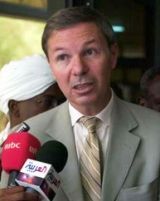UN says Sudan still far from accepting Darfur force
March 19, 2007 (UNITED NATIONS) -– There is still “a long way to go” before the UN and the Sudan can resolve their differences over the situation in the war-torn Darfur region and the proposed speedy deployment of a hybrid UN-African Union (AU) peacekeeping force to protect civilians and stop the bloodshed there, the top peacekeeping official warned today.
 Jean-Marie Guehenno, Under-Secretary-General for Peacekeeping Operations, told a Security Council meeting that the latest written response from Sudanese President Omar Hassan Al Bashir to Secretary-General Ban Ki-moon’s letter detailing the planned force indicated there may be “fundamental strategic differences” over Darfur.
Jean-Marie Guehenno, Under-Secretary-General for Peacekeeping Operations, told a Security Council meeting that the latest written response from Sudanese President Omar Hassan Al Bashir to Secretary-General Ban Ki-moon’s letter detailing the planned force indicated there may be “fundamental strategic differences” over Darfur.
“We still have, unfortunately, a long way to go because there may be some fundamental misunderstandings on what are the expectations of the Government of Sudan and what is on offer,” he told journalists following the closed-door meeting.
Guehenno said the international community has already “waited much too long,” given the level of suffering across Darfur, where more than 200,000 people have been killed and at least 2 million others forced from their homes since 2003.
A peace deal signed last year by some of the parties failed to end the fighting between Government forces, allied Janjaweed militias and rebel groups, and the conflict is starting to spill over into neighbouring Chad and the Central African Republic (CAR).
“We do believe that it’s important to have a strong peacekeeping presence there,” he said. “We believe that it’s important to have a political process, but that political process needs to be supported by a solid peacekeeping presence. One supports the other. One without the other will not be sustainable.”
Last week Ban also expressed frustration that Bashir had raised a number of reservations on ideas relating to the hybrid force and other joint measures involving the UN and the AU to bring peace to Darfur, an impoverished region the size of France on Sudan’s western flank.
Guehenno said Council members must now play a role in helping the Sudanese Government to overcome its differences on the hybrid force and related issues.
Asked if there was a timeline for intervention, given the dire humanitarian situation, the Under-Secretary-General said: “The timeline has been broken many times. I think we should have [had] an answer yesterday.”
Guehenno added the UN would also continue to discuss the need for a separate UN peacekeeping force in Chad with Government officials from that country.
Today’s Council meeting took place on the eve of the first visit to the region by the UN’s new humanitarian chief. John Holmes, Under-Secretary-General for Humanitarian Affairs and Emergency Relief Coordinator, is scheduled to depart tomorrow on a two-week mission to Sudan, Chad and the CAR.
Holmes will begin his trip in the Sudanese capital, Khartoum, before heading to Juba, in southern Sudan, and then to Darfur in the country’s west. The next leg will be in eastern Chad, with the final stage in northern CAR and that country’s capital, Bangui.
Meanwhile, the UN Mission in Sudan (UNMIS) reports that armed attacks on villages continue in Darfur, with the latest strike against a village north of the West Darfur provincial capital of El Geneina. Villagers in the nearby Jebel Moon area have begun fortifying their defences in anticipation of similar attacks.
Also in West Darfur, some 550 Chadian refugees have asked to move away from border areas because of security concerns, with the first batch of 220 successfully moved over the weekend to the camp run by the UN High Commissioner for Refugees (UNHCR) at Um Shalaya.
(UN News)
